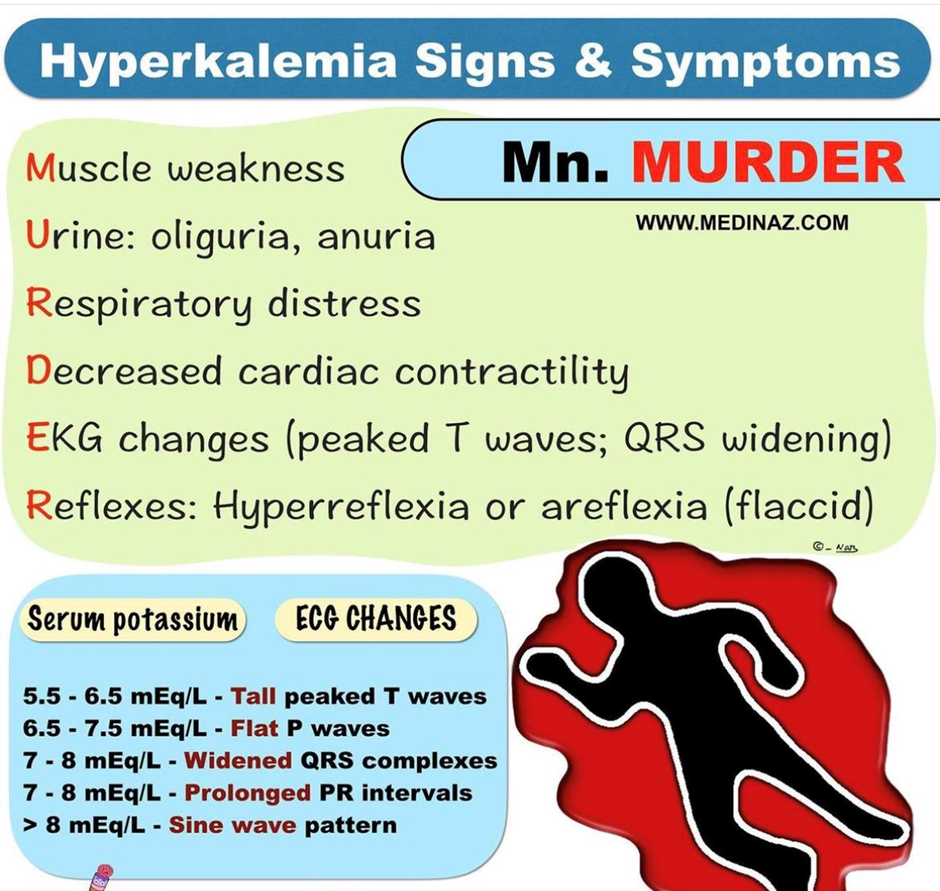A nurse is collecting data from a client who is receiving IV fluid replacement to treat diarrhea but now has oliguria. Laboratory results include a potassium level of 5.6 mEq/L. The nurse should report which of the following findings to the provider immediately?
Muscle weakness
Paresthesias
Abdominal cramps
Palpitations
The Correct Answer is D
Choice A Reason:
Muscle weakness is incorrect. Muscle weakness can be a symptom of hyperkalemia (elevated potassium levels). However, it is not the most urgent symptom, and the provider should be informed to address the underlying cause.
Choice B Reason:
Paresthesias is incorrect. Paresthesias (tingling or numbness) can also occur with hyperkalemia. While important to assess, it may not be the most urgent symptom requiring immediate attention.
Choice C Reason:
Abdominal cramps is incorrect. Abdominal cramps can be associated with hyperkalemia, but they are not the most critical symptom. It's essential to address the underlying cause, but it may not require immediate intervention compared to other symptoms.
Choice D Reason:
Palpitations is correct. Palpitations are a concerning symptom, especially in the context of hyperkalemia. Elevated potassium levels can lead to cardiac arrhythmias, and palpitations may be indicative of serious cardiac complications. This is a critical finding that requires immediate attention from the healthcare provider.

Nursing Test Bank
Naxlex Comprehensive Predictor Exams
Related Questions
Correct Answer is C
Explanation
Choice A Reason:
Reinforcing discharge teaching with the client's partner who speaks the languages of both the client and the nurse is not appropriate. While involving the client's partner may be helpful, it's essential to ensure that the information is accurately and comprehensively translated. Relying solely on the partner may not guarantee clear communication.
Choice B Reason:
Asking a nurse from another unit who speaks the same language as the client to reinforce the discharge teaching is inappropriate. While this option might be helpful if such a nurse is available, it may not always be practical to find a nurse who speaks the specific language required. Additionally, the nurse's expertise in the discharge instructions may vary.
Choice C Reason:
Requesting that a medical interpreter assist with translating the discharge teaching for the client is appropriate. Using a medical interpreter ensures accurate and clear communication, reducing the risk of misunderstandings. It promotes effective communication between the nurse and the client, ensuring that important information about post-discharge care is accurately conveyed.
Choice D Reason:
Using nonverbal communication with gestures to reinforce discharge teaching with the client is inappropriate. While nonverbal communication and gestures can be supplementary, relying solely on them may not convey detailed information accurately. Important details about medications, follow-up appointments, and self-care may be lost without verbal communication.
Correct Answer is A
Explanation
Choice A Reason:
Placing the drainage system below the client's chest level is appropriate. This positioning allows for proper drainage and prevents the backflow of fluid or air into the chest. Maintaining the drainage system below the chest level helps ensure effective evacuation of air or fluid from the pleural space.
Choice B Reason:
Looping excess tubing next to the client's side is inappropriate. Looping excess tubing can create dependent loops, potentially causing fluid to accumulate in these areas and compromising the drainage system's effectiveness.
Choice C Reason:
Clamping the tubing when ambulating the client is inappropriate. Chest tube drainage systems should not be routinely clamped during ambulation. Clamping can lead to increased pleural pressure, potentially causing tension pneumothorax or other complications.
Choice D Reason:
Milking the client's tubing every shift is inappropriate. Milking or stripping the tubing is not recommended, as it can create a pressure gradient that may damage the lung tissue or disrupt the chest tube's seal. Passive drainage is preferred to maintain the negative pressure in the system.
Whether you are a student looking to ace your exams or a practicing nurse seeking to enhance your expertise , our nursing education contents will empower you with the confidence and competence to make a difference in the lives of patients and become a respected leader in the healthcare field.
Visit Naxlex, invest in your future and unlock endless possibilities with our unparalleled nursing education contents today
Report Wrong Answer on the Current Question
Do you disagree with the answer? If yes, what is your expected answer? Explain.
Kindly be descriptive with the issue you are facing.
